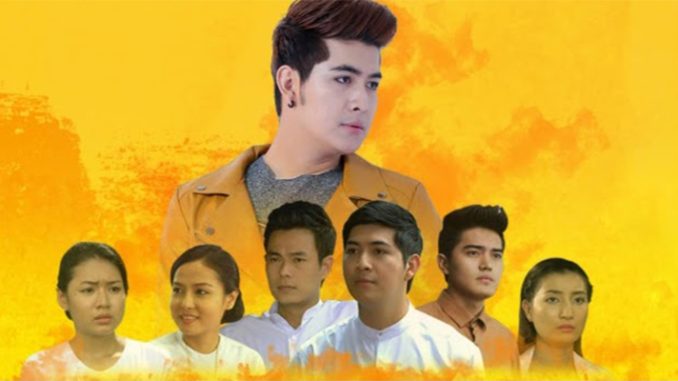
Drama series title: Lu Yay Chon (The Good Person)
Director: Ko Thaung
Scriptwriters: Myat Phone Mo, Nyi Aung Nyi, Aung Nay Ko Ko, Hein Zaw Oo, Kyaw Yazar Ko
60 episodes (April 2016- July 2016)
In Myanmar, the trend of broadcasting “zat lan twe” (television series) became widespread only during the last decade. Among those, ”The good person” has gained the highest popularity across the country. It was broadcasted by MRTV-4 which is one of the most popular private TV channels in Myanmar. For 60 episodes in total, it showed every weekday during April to July 2016. It narrates the character change of the protagonist, Zwe Naing, a young man who comes from a rich family in the city. His good and admirable personality touches the life of the people whom he meets in his own life-journey.
Zwe Naing was born as the only son of a rich family that was initially based on Yangon, the most developed and biggest city in the country. Initially, he was primarily passionate for auto-racing and had ambitions to be number one. His leisure pursuit represents the current trends among youths of rich families in Yangon for auto-racing, especially with expensive cars. It illustrates the economic change of their generation with the 2011 democratic transition and also, works as a statement of their class.
Conflicts between the reckless young man and his father was growing as he had never fulfilled his father’s expectation – an expectation that is associated with conservative values. To settle this conflict, he accepted his father’s challenge in exchange his father would support his dream in auto-racing. He would have to spend one year in Myauk Taw village, near the Popa mountain (a dry zone area in central Myanmar), by working as a teacher at a local elementary school. With this, the drama is centered on how an urban young man from a typical La Dolce Vita family could survive as a teacher in the rural area and more over, find meaning in his life.
As expected, he experienced many ups and downs. It was through all of these ups-and-downs that he learned the asset of life and the values of being a good person to support the development of the society by putting aside his past personal passionate for auto-racing. In this regard, his character-change is a result of his interaction with the common people in real life, beyond his former world.
Interestingly, this series highlights the stereotypical differences between urban areas and rural areas: the people, living standards, way of living, way of thinking, and even landscapes and accessibility. It shows that because of inaccessibility, illiteracy, and lack of adequate capital, people in rural areas are dominated by the urban elite people. Its story dramatizes how the urban elite is ready to take advantage of the naïve rural population. It illustrates the most pressing issues in contemporary Myanmar: rural poverty and the increasing inequalities. As a developing country, about 70% of Myanmar’s population are residing in the rural areas, and many of them live in poverty and suffer under-developments. The series offers a solution to these issues: the role of young leaders. Zwe Naing presents his leadership in many situations during his time in the rural area; he is a model young leader.
An audience may easily identify with the supposedly important message left by this drama series: to be a good person to inspire others. It includes inspiration, sympathy, leadership, working-together, loyalty, and helping others – all the qualities that Zwe Naing learns to practice. It is, indeed, an important message. But, would the young urban audience identify themselves to Zwe Naing while they see the opposite in their daily life? How could they learn to practice leadership, loyalty and helping others in the society when the government itself pays little attention to these issues for the fulfillment of their life?
Regardless of all these points, the audience could still enjoy this drama series solely for its entertainment value. In it, they may find some comfort, an escape from their urban mundane lives. More drama series will certainly come along to entertain them, despite the socio-political changes. As part of the process, a consuming market has already been created.
Reviewed by Phyu Phyu Lwin
Graduate School of Agriculture, Kyoto University
https://www.youtube.com/watch?v=AiX03jHv83w&list=PLj6wWAhANbacan8u3Gkvfkg_1a4dYY1rv&index=2
